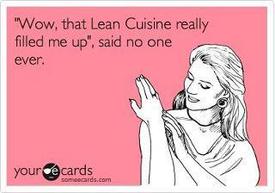1200 calorie limit- too high for short people???
Replies
-
I am 4'11" and I have lost almost 50 pounds in a year eating 1300+ calories a day. I'm doing it the healthy way... slow and steady to KEEP it off for GOOD... I personally feel like if you're doing it on your own dropping below 1200 just isn't a good idea... if you're doing it at the advice and under the supervision of a doctor, then do what the dr says... it's what they went to school for, right?0
-
A co-worker is doing the short person diet (1100 calories per day and every fourth day it's 1600 calories) and has done well. She has to eat certain foods and does no weight lifting, just cardio and stretching. Good luck!0
-
Age definitely makes a difference! If you decide to calculate your own Base Metabolic Rate (you can find various formulas on line) and all of them factor in a person's age. As well the weight you start out out makes a difference as well. Both my daughter and I are 5'2". Her BMR is 1700-1800 (if she doesn't want to lose any weight), whereas mine is 1900-2000 (again, if I don't want to lose any weight). The heavier you are, the more calories in takes to run the machine. Kind of like comparing a '67 Chev Belair to a '12 Toyota Corolla - they both run on gasoline, but you'll go farther on a gallon of gas in the Corolla.it doesnt matter what size or age you are we all have the same amount of calories to eat. the only difference is gender related. if you exercise you should eat the aount of calories to compensate for it, so you dont starve your body. the less you eat the slower your metabolism will be and the less weight you wil lose. in fact you are more likely to gain.0 -
I am pleased with my weight loss and I have rarely eaten below 1200 and most often around 1500. I am 5'7" started at 212 and currently have a 49 pound loss today.
More importantly for me is having the correct amount protein, fat, calcium and fiber. Loosing weight would mean nothing to me if I ate 1200 calories of junk food. That is why I like the food diary. Keeps my protein on tract.0 -
I guess it really depends on how active you are. A small person does need fewer calories than a larger person in general, but individuals can vary a lot. I'm 5'1", but on a busy day while I'm walking around, I can have a total burn of 2300 for the day without deliberately "exercising," at least according to the numbers I get from my GoWear armband. On a day like that, eating 1200 because I didn't "really work out" would be a huge deficit.
The one thing I've noticed since getting the armband is how significant your daily activity really is. It doesn't sound like much to say that you burn 0.5 or 1 extra calorie a minute that you're strolling around the house instead of lounging on the couch, but add that 1 calorie up for several hours and you have a nice little boost going on!
Sorry if I got off-topic. What I really mean to say is that 1200 might be too high for a very small person, but he/she would also have to be fairly inactive, I'd guess. In that case, I think it would be better to look at ways to burn more rather than eat less.0 -
Context matters, people.
There's nothing magical about 1200 calories. It's just an arbitrary guideline.
A small person may very well need to consume less than that to lose weight, especially if they're sedentary.0 -
I'm 5'2 and 135 lbs. Want to be 120. 1200 calories is way too little for me. I would get very cranky if I tried it. I eat between 1700-2000 calories per day. I'm losing weight. Slowly, but still losing.0
-
I eat 1200 calories and I gain... I've had problems with disorders and food in the past though for a number of years so my metabolism isn't what it used to be before all that. That probably has more to do with it than my height. (5'2")
I would aim for what you can but my advice would be to try and eat your 1200 calorie goal. Find higher calorie healthy foods like nuts and peanut butter and olive oils in cooking to add extra calories to your day.
From experience, you don't want to end up like I am now with a terrible metabolism that makes you gain weight if you eat more than 1000 calories a day!
 0
0 -
I agree with you. I am a short woman and if I did the sugessted calories I get no where also.1
-
You do not want to do anything less than 1200 calories. Otherwise your body thinks its starving and it will try to hold on to the fat to survive. Nada Bueno!0
-
Relax, this isn't a race.
This!0 -
height is irrelevant to metabolic rate and calorie consumption/burn. Weight is already figured in.
Height is figured into a specific calorie recommendation for you. It is not figured into a 1200 calorie floor.
I'm 5'10", female, and 53. My floor is different from someone who is 4'11, 13, and male.
1200 is a model based on an average person. Is it pretty good? Yes. Might my floor be HIGHER because I'm taller? Yes. Might a different person's be lower? Yes.0 -
Here are two studies on mass-specific energy expenditure relative to height:
http://www.ncbi.nlm.nih.gov/pubmed/17690196Abstract
Two observations favor the presence of a lower mass-specific resting energy expenditure (REE/weight) in taller adult humans: an earlier report of height (H)-related differences in relative body composition; and a combined model based on Quetelet and Kleiber's classic equations suggesting that REE/weight proportional, variantH(-0.5). This study tested the hypothesis stating that mass-specific REE scales negatively to height with a secondary aim exploration of related associations between height, weight (W), surface area (SA), and REE. Two independent data sets (n = 344 and 884) were evaluated, both with REE measured by indirect calorimetry and the smaller of the two including fat estimates by dual-energy X-ray absorptiometry. Results support Quetelet's equation (W proportional, variantH(2)), but Kleiber's equation approached the interspecific mammal form (REE proportional, variantW(0.75)) only after adding adiposity measures to weight and age as REE predictors. REE/weight scaled as H( approximately (-0.5)) in support of the hypothesis with P values ranging from 0.17 to <0.001. REE and SA both scaled as H( approximately 1.5), and REE/SA was nonsignificantly correlated with height in all groups. These observations suggest that adiposity needs to be considered when evaluating the intraspecific scaling of REE to weight; that relative to their weight, taller subjects require a lower energy intake for replacing resting heat losses than shorter subjects; that fasting endurance, approximated as fat mass/REE, increases as H(0.5); and that thermal balance is maintained independent of stature by evident stable associations between resting heat production and capacity of external heat release. These observations have implications for the modeling of adult human energy requirements and associate with anthropological concepts founded on body size.
http://www.ncbi.nlm.nih.gov/pubmed/19856424Body size and human energy requirements: Reduced mass-specific total energy expenditure in tall adults.
Heymsfield SB, Pietrobelli A.
Source
Global Center for Scientific Affairs, Merck & Co, Rahway, New Jersey, SUA. Steven_Heymsfield@Merck.Com
Abstract
Mammalian resting energy expenditure (REE) increases as approximately weight(0.75) while mass-specific REE scales as approximately weight(-0.25). Energy needs for replacing resting losses are thus less relative to weight (W) in large compared with small mammals, a classic observation with biological implications. Human weight scales as approximately height(2) and tall adults thus have a greater weight than their short counterparts. However, it remains unknown if mass-specific energy requirements are less in tall adults; allometric models linking total energy expenditure (TEE) and weight with height (H) are lacking. We tested the hypothesis that mass-specific energy requirements scale inversely to height in adults by evaluating TEE (doubly labeled water) data collected by the National Academy of Sciences. Activity energy expenditure (AEE) was calculated from TEE, REE (indirect calorimetry), and estimated diet-induced energy expenditure. Main analyses focused on nonmorbidly obese subjects < or =50 yrs of age with non-negative AEE values (n = 404), although results were directionally similar for all samples. Allometric models, including age as a covariate, revealed significantly (P < 0.05) greater REE, AEE, and TEE as a function of height (range H(1.5-1.7)) in both men and women. TEE/W scaled negatively to height ( approximately H(-0.7), P < 0.01) with predicted mass-specific TEE (kcal/kg/d) at +/-2 SD for US height lower in tall compared with short men (40.3 vs. 46.5) and women (37.7 vs. 42.7). REE/W also scaled negatively to height in men (P < 0.001) and women (P < 0.01). Results were generally robust across several different analytic strategies. These observations reveal previously unforeseen associations between human stature and energy requirements that have implications for modeling efforts and provide new links to mammalian biology as a whole.
Take two individuals with similar builds and guess who has the lower energy expenditure: the taller or shorter person? The answer is in those studies.0 -
1200 calories is arbitrary. To lose, I have to eat about 1000 as well. As long as you make good choices you will get the nutrients you need at 1000 calories.
^This^
No one else is going to be brave enough to go under 1200 calories due to fear of losing lean muscle mass. But I agree that this isn't a race. It took you many months to get to where you're at, it'll take just the same to get you back down. Fast or slow, if you choose fast you will have to practically starve your body (1000 calories or less) but it can be done with a multi-vitamin and eating a WIDE range of veggies/fruits for your calories; but if you choose slow, you will have results without much effort as long as you're eating healthy at 1200.0 -
I have the same issue, i used to weigh 145 and after eating 1200 calories a day with no exercise and got down to 120. But now I can barely eat 1200 calories a day. I eat 800-100 and I function just fine. It actually makes me mad when people with different bodies say anyone eating under 1200 a day have an eating disorder or are unhealthy. Height definitely isn't accounted for. My boyfriend can eat 2500 calories a day and not gain a pound because he is 6'2, but if I did that I would be obese. Do what you feel healthy doing.0
-
One thing that seems to have been overlooked in this thread is proportion; that is if a woman that is 5"9 lost 10 pounds and a woman who was 5"1 lost 10 pounds, it would be much more noticeable on the shorter woman than on the taller woman, so while yes actual pound by pound the weight loss may be slower, proportionally it still works out. Ergo, shorter women with not much to lose don't need to be losing 1lb a week, but can keep a smaller deficit, eat net 1200kcals minimum, but still get good results from that deficit.
It would be wise to take progress pictures in these cases though, instead of weighing oneself weekly, as the scale wouldn't be accurate enough to track 0.5lbs loss (in my opinion) .0 -
At first I was like that probably because I wanna see some fast results. But then later on I realized I've lost 25 pounds eating 1200.. then upping my cals to maintenance.. So nope.. 1200 is okay..
Btw.. Im a sedentary petite and it still worked. 0
0 -
One thing that seems to have been overlooked in this thread is proportion; that is if a woman that is 5"9 lost 10 pounds and a woman who was 5"1 lost 10 pounds, it would be much more noticeable on the shorter woman than on the taller woman, so while yes actual pound by pound the weight loss may be slower, proportionally it still works out. Ergo, shorter women with not much to lose don't need to be losing 1lb a week, but can keep a smaller deficit, eat net 1200kcals minimum, but still get good results from that deficit.
It would be wise to take progress pictures in these cases though, instead of weighing oneself weekly, as the scale wouldn't be accurate enough to track 0.5lbs loss (in my opinion) .
^^ this0 -
bump0
This discussion has been closed.
Categories
- All Categories
- 1.4M Health, Wellness and Goals
- 398.1K Introduce Yourself
- 44.7K Getting Started
- 261K Health and Weight Loss
- 176.4K Food and Nutrition
- 47.7K Recipes
- 233K Fitness and Exercise
- 462 Sleep, Mindfulness and Overall Wellness
- 6.5K Goal: Maintaining Weight
- 8.7K Goal: Gaining Weight and Body Building
- 153.5K Motivation and Support
- 8.4K Challenges
- 1.4K Debate Club
- 96.5K Chit-Chat
- 2.6K Fun and Games
- 4.8K MyFitnessPal Information
- 12 News and Announcements
- 21 MyFitnessPal Academy
- 1.5K Feature Suggestions and Ideas
- 3.2K MyFitnessPal Tech Support Questions
















